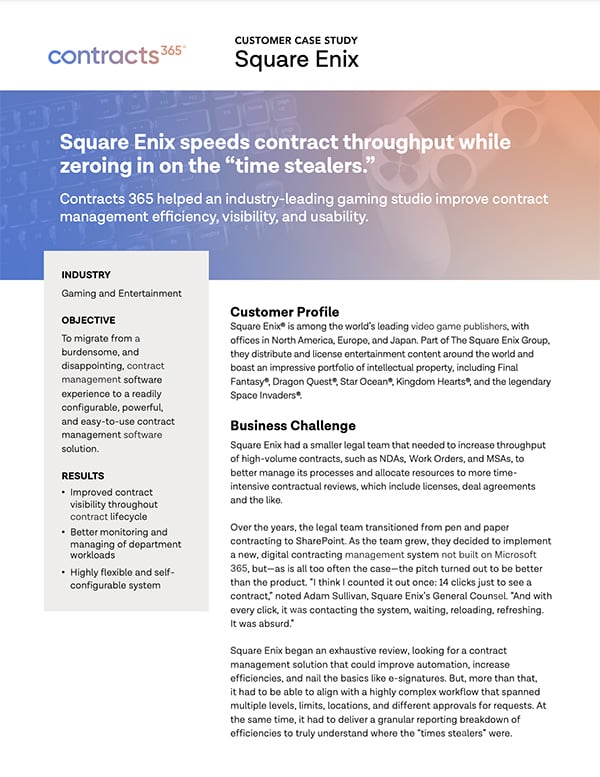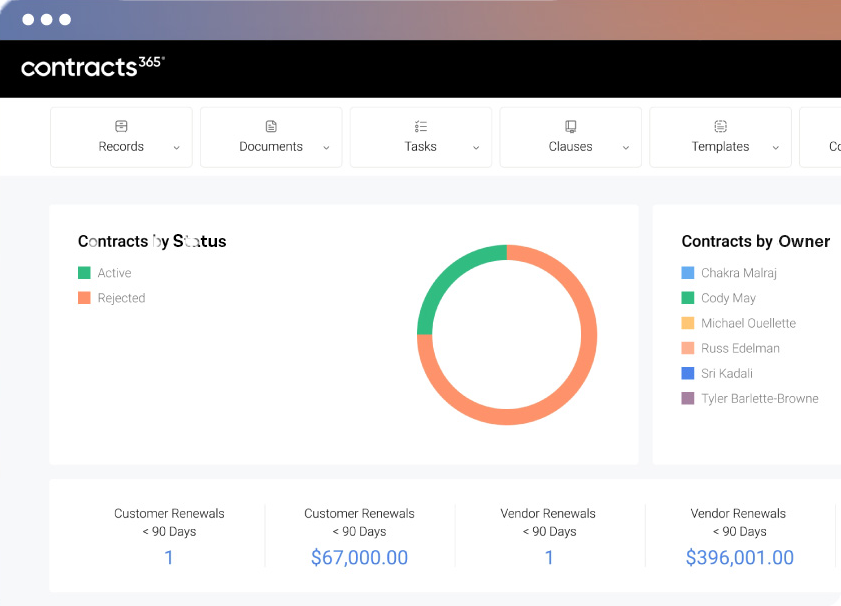Use self-service contracts to improve productivity, close contracts faster, and minimize risk
What are Self-Service Contracts?
Self-service contracts are agreements that are created and signed without the involvement of a legal team. They are typically created using templates, that have been approved by legal.
Self-service contracts let your employees make contracts without consulting legal teams. If you haven’t used self-service contracts, an important feature of modern contract management software, this may sound like a risky proposition. Don’t you need your lawyers to review contracts to make sure your interests are protected?
How do Self Service Contracts Work?
With self-service contracts, you take the guesswork – but not the legal expertise – out of contract preparation, writing, negotiation, and finalization. At its simplest, self-service contracts work like this:
- Lawyers draft and approve standard language for a variety of contract templates.
- Lawyers and contract managers compose the key questions that will guide a business user to the right contract and language.
- Business users who need a contract access the system, answer those key questions in an electronic form and, and based on their answers, are presented with a contract using pre-approved language, appropriate to their business need.
For some contracts like NDAs, CDAs, standard sales agreements, and basic consulting agreements, it really is that simple.
How Self Service Contracts Improve Your Business
We’ll come back to the more complicated cases in a minute – but here are three ways self-service contracts can help your company thrive.
1. Automate Basic Contracts to Focus on High-Value Activities
The steps required for requesting a simple contract don’t require much thinking about the contract’s terms, only its appropriateness. Business users know the types of agreements they need and, by answering key questions, they can access and deploy the right contract to get the job done quickly.
By using self-service contracts, business users save time and avoid redundant requests to legal for standard contracts. They can focus on the higher value activity that they need the contract for: selling a product, licensing a software solution, discussing a collaboration that requires confidentiality. And with the contract in place, they can move on to the next activity -- forming relationships with new clients, managing relationships with existing clients, and researching potential users of your products.
Users who can benefit from self-service contracts include
- Sales personnel selling standard goods and services
- Business users who need a contract from procurement for simple, well-understood purchase
- Business users across the organization who need standard contracts like NDAs in order to proceed with discussions
And there is one more user in the company whose time is freed by self-service contracts for high-value work: the attorney.
By restricting requests for commonly used contracts to the self-service contract management software, attorneys can review the language once and be assured that the language will be included each time the contract is used. Legal also has the option of reexamining the language periodically and making improvements that will apply to that contract going forward. This aspect of self-service contracts allows the legal team to spend time on high-value contracts requiring detailed drafting, negotiation, and review.
2. Close Contracts Sooner by Reducing Your Contract Cycle Times
The more time your employees spend requesting and waiting for contracts, the less efficient your organization becomes. Waiting for any contract – an NDA, a sales contract, a procurement contract – delays the business that the user needs to accomplish. That also delays sales, vital purchases, or discussions requiring confidentiality. This can mean fewer deals and missed revenue opportunities.
Self-service contracts make it possible to close deals more quickly, when the sales person knows the client is ready to act.
Self-service contracts can also expedite a purchasing request, something that is important for meeting production, research, IT or business goals.
3. Ensure Contracts Include Only Approved Language
Members of your sales team don’t have the legal knowledge needed to create contracts that protect the company in a transaction. Business users don’t have procurement’s expertise in protecting against late or inadequate delivery of goods and services. That’s why businesses need legal counsel and procurement professionals before they initiate new contracts.
Self-service contracts make the lawyer’s involvement in any simple contract unnecessary because these contracts include only language that has already been approved by legal counsel.
Since your sales professionals and other employees must use the contract management software to request and generate contracts, they are held to that approved language in the contracts they create. You don’t have to worry that someone will make a mistake that hurts your business. Instead, you give your employees the power they need to make legitimate agreements that include the terms and clauses you require.
This also holds true for procurement terms that protect you as a buyer. For basic purchases of goods and services, procurement can ensure that the contract templates include language that covers contingencies such as lateness, substitution of goods, and failure to deliver adequate services.
Use of self-service contracts with approved language increases legal’s control of risk while reducing their time spent on redundant review. At the same time, self-service contracts make business users more independent by giving them access to the contracts they need instead of making them rely on person-to-person requests for every transaction.
Download the Square Enix Case Study
Learn More
Encouraging Self-Service beyond the Simple Cases
We mentioned earlier that some contracts are more complicated than a simple sales agreement or an NDA. That’s true, but self-service contracts are still a good fit for contracts where the varying conditions are well understood. For example:
- A sales or procurement contract below a certain dollar amount may present little risk to the company, but that risk grows as the financial commitment grows. Self-service contracts can be made to automatically require higher-level approvals in the company when their dollar amounts exceed a certain threshold. The same contracts can also automatically insert language to protect the company in light of the increased financial stakes.
- An NDA may have fairly strict terms at the outset, but those terms may cause some counterparties to push back. A self-service contract can allow a business user to substitute less demanding fall-back clauses that legal has reviewed and approved, without the need to request approval of the change.
- A business user requesting a procurement contract through the online questionnaire may provide information that shows the request is beyond the norm – either in quantity, cost, or specifications. A self-service contract can create a contract record with all the information needed to put the contract in motion, and a workflow to bring the request to the attention of the procurement and legal officers whose expertise is truly required for this contract.
In short, self-service contracts are not limited to simple high-volume, low-value agreements. They save time and effort by triaging agreements that need additional review and approval while still placing the business user in the driver’s seat.
Self-service contracts benefit companies in numerous ways. And adopting the right contract management software with advanced self-service features, can improve your business’s processes significantly by making employees more productive, closing contracts faster, and taking legal counsel out of the process except when necessary.
If you’d like to learn more about how our contract management software for businesses that run Microsoft 365 can improve your contract processes, please don’t hesitate to reach out to us or, even better, request a demo below, and we can show you how it works in real-time.
Subscribe and receive our latest blog articles in your work email.
We value your privacy. By subscribing, you agree to receive our newsletter. We’ll protect your personal data and use your email only for sending useful information. You can unsubscribe anytime. For details on data handling, please see our privacy policy.
Ready to Learn More?
Optimize your team’s contract lifecycle management with Contracts 365®
